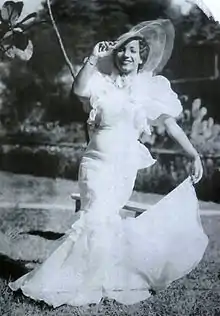Hello, Hello Brazil!
Hello, Hello Brazil! (Portuguese: Allô, Allô, Brasil!) is a 1935 Brazilian musical film directed by Wallace Downey and Adhemar Gonzaga, starring Carmen Miranda. The screenplay was written by Alberto Ribeiro and João de Barro.[1]
| Hello, Hello Brazil! | |
|---|---|
 Carmen Miranda in Hello, Hello Brazil! | |
| Directed by | João de Barro Wallace Downey Alberto Ribeiro |
| Produced by | Wallace Downey Adhemar Gonzaga |
| Written by | Alberto Ribeiro João de Barro |
| Cinematography | Edgar Brasil A.P. Castro Luiz de Barros Ramon García Antonio Medeiros Fausto Muniz |
Production company | |
Release date | February 4, 1935 |
| Country | Brazil |
| Language | Portuguese |
Production
Wallace Downey began his career producing successful musical films for Americans with established artists from Brazilian radio. Carmen Miranda, star of this 1935 film, was one such star. A co-production between Waldown Filmes and Cinédia, Allô, Allô, Brasil! presented a multitude of singers, comedians and radio presenters, such as vocalists Francisco Alves and Mário Reis.
A close tie-in with the radio world manifested in this films storyline. Written by popular composers duo João de Barros and Alberto Ribeiro, it portrayed the adventures of a "radiomaníaco" who falls for a nonexistent radio singer.
The two genres of music synonymous with the carnival, including the samba and the march, had a prominent place in early Brazilian musicals and popular movies.[2]
Cast
- Almirante
- Ary Barroso
- Aurora Miranda
- Carmen Miranda
- Adhemar Gonzaga
- César Ladeira
- Virgínia Lane
- Francisco Alves
- Mário Reis
- Ivo Astolphi ... as Bando da Lua
- Dircinha Batista
- Simão Boutman
- Sílvio Caldas
- Chico Chico
- Apolo Correia
- Elisa Coelho de Almeida
References
- "ALÔ! ALÔ! BRASIL". p. Cinemateca Brasileira. Retrieved September 1, 2014.
- "Estudos de cinema, Volumes 2-3". Alex Viany. Retrieved September 1, 2014.
External links
Further reading
- Bryan McCann, Hello, Hello Brazil: Popular Music in the Making of Modern Brazil (Durham: Duke University Press, 2004)